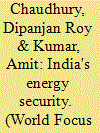|
|
|
Sort Order |
|
|
|
Items / Page
|
|
|
|
|
|
|
| Srl | Item |
| 1 |
ID:
096077


|
|
|
|
|
| Publication |
2010.
|
| Summary/Abstract |
The aim is to observe how hydrogen, in its wider meaning as a 'system innovation', is understood by a cross section of the general public in three regions of the UK that have embryonic developments: Teesside, South West Wales and London.
Focus groups were conducted in two separate phases: the first, involving nine groups, took place between June 2005 and March 2006; the second, involving seven groups, took place in the period October-November 2006, mainly with groups reconvened after the first phase. They presented to participants 'user-friendly' information about possible scenarios for a hydrogen economy, and helped the group to identify criteria that might be most salient for decision-makers.
Public awareness of hydrogen in the three case study areas, both in general and in relation to local demonstration projects, proved minimal, with the exception of the few who had direct experience of the chemical industry (in Teesside and South West Wales).
When engaged in an informed debate about hydrogen and its future possible developments, participants were willing to learn about the different options and expected to be fully informed on how these would impact on their everyday lives as consumers and citizens. Risk perception is important, but not the only factor in lay understanding of hydrogen. More relevant is the extent to which the different configurations of hydrogen systems align with the public's 'view of the world' (social and environmental values, needs and expectations) and how participants think hydrogen energy would be embedded in their daily routines. There is a lack of trust in political authorities, business and industry, and within and across different social groups; ambivalence in how trust is placed on information providers, role models and opinion formers; and public unease in dealing with, and making sense of, conflicting information coming from 'expert' sources.
The evidence is useful to inform policy, both on national and local level. It is especially useful in addressing public engagement as a political strategy.
|
|
|
|
|
|
|
|
|
|
|
|
|
|
|
|
| 2 |
ID:
118090


|
|
|
| 3 |
ID:
065332


|
|
|
|
|
| Publication |
Santa Monica, Rand Corporation, 2005.
|
| Description |
xi, 48p.
|
| Standard Number |
0833038176
|
|
|
|
|
|
|
|
|
|
|
|
Copies: C:1/I:0,R:0,Q:0
Circulation
| Accession# | Call# | Current Location | Status | Policy | Location |
| 050034 | 333.793/BER 050034 | Main | On Shelf | General | |
|
|
|
|
| 4 |
ID:
183561


|
|
|
|
|
| Summary/Abstract |
As a developing country, the Philippines must balance its rapid industrialization efforts with the realities and consequences of climate change on the country. A feasible option to achieve this is increasing the share of renewables in power generation coupled with energy storage technology. This paper examines the present situation and opportunities for development of hydrogen and fuel cell technology in the Philippines as promising alternatives with proven applications in niche energy demand sectors aside from renewables integration. Although the Philippines is considered a latecomer, there is significant renewable resource potential, available local experts and trained talents, and enabling legislations in the country that provide opportunities in harnessing fuel cell technologies for the transition to energy self-sufficient and low-carbon society. Current advancement of the technology in the country is limited to an initial 5-year roadmap, focused on component development from cheap and local materials. Provisions for large-scale hydrogen infrastructure have not yet been realized, which is comparable to the early stages of development in other countries that are also pursuing fuel cell technology. Strong industry-academe partnerships should be pursued through a specific legislated agency to ensure future development of this technology for the country's benefit. Lastly, applications in distributed power generation poised to be a lucrative direction, as demonstration and validation with other potential uses such as transportation remains a challenge.
|
|
|
|
|
|
|
|
|
|
|
|
|
|
|
|
|
|
|
|
|